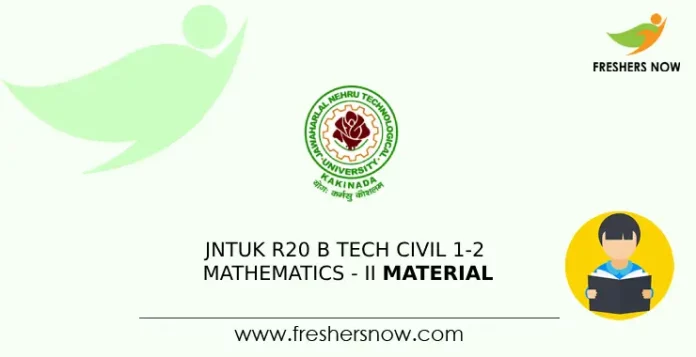
JNTUK R20 B Tech Civil 1-2 Mathematics – II Material/ Notes PDF Download: The JNTUK R20 B.Tech 1-2 Mathematics – II Material serves as a comprehensive resource designed to equip engineering students with essential mathematical tools crucial for practical applications in various domains. This material focuses on developing proficiency in matrix algebra techniques, imperative for engineers to analyze complex systems and structures. It covers methods such as Gauss elimination, Gauss Jordan, and Gauss-Seidel, enabling students to efficiently solve systems of linear algebraic equations encountered in engineering problems.
JNTUK R20 B Tech 1-2 Mathematics – II Material – Units
| No. Of Units | Name of the Unit |
| Unit – 1 | Solving systems of linear equations, Eigen Values, and Eigen Vectors |
| Unit – 2 | Cayley–Hamilton theorem and Quadratic forms |
| Unit – 3 | Iterative methods |
| Unit – 4 | Interpolation |
| Unit – 5 | Numerical differentiation and integration, Solution of ordinary differential equations with initial conditions |
Unit 1 Syllabus PDF Download | JNTUK R20 B Tech 1-2 Mathematics – II Material
Solving systems of linear equations, Eigen values, and Eigen vectors: (10hrs) Rank of a matrix by echelon form and normal form – Solving system of homogeneous and nonhomogeneous linear equations – Gauss Elimination method – Eigen values and Eigen vectors and properties.
| JNTUK R20 B Tech Mathematics – II Material – PDF Download | |
| To Download JNTUK R20 B Tech Civil Mathematics – II Material Unit – 1 PDF | Download PDF |
Unit 2 Syllabus PDF Download | JNTUK R20 B Tech 1-2 Mathematics – II Material
Cayley–Hamilton theorem and Quadratic forms: (10hrs) Cayley-Hamilton theorem (without proof) – Applications – Finding the inverse and power of a matrix by Cayley-Hamilton theorem – Reduction to Diagonal form – Quadratic forms and nature of the quadratic forms – Reduction of quadratic form to canonical forms by orthogonal transformation. Singular values of a matrix, singular value decomposition
| JNTUK R20 B Tech Mathematics – II Material – PDF Download | |
| To Download JNTUK R20 B Tech Civil Mathematics – II Material Unit – 2 PDF | Download PDF |
Unit 3 Syllabus PDF Download | JNTUK R20 B Tech 1-2 Mathematics – II Material
Iterative methods: (8 hrs) Introduction– Bisection method–Secant method – Method of false position– Iteration method – Newton-Raphson method (One variable and simultaneous equations) – Jacobi and Gauss-Seidel methods for solving system of equations numerically.
| JNTUK R20 B Tech Mathematics – II Material – PDF Download | |
| To Download JNTUK R20 B Tech Civil Mathematics – II Material Unit – 3 PDF | Download PDF |
Unit 4 Syllabus PDF Download | JNTUK R20 B Tech 1-2 Mathematics – II Material
Interpolation: (10 hrs) Introduction– Errors in polynomial interpolation – Finite differences– Forward differences– Backward differences –Central differences – Relations between operators – Newton’s forward and backward formulae for interpolation – Interpolation with unequal intervals – Lagrange’s interpolation formula– Newton’s divide difference formula.
| JNTUK R20 B Tech Mathematics – II Material – PDF Download | |
| To Download JNTUK R20 B Tech Civil Mathematics – II Material Unit – 4 PDF | Download PDF |
Unit 5 Syllabus PDF Download | JNTUK R20 B Tech 1-2 Mathematics – II Material
Numerical differentiation and integration, Solution of ordinary differential equations with initial conditions: (10 hrs) Numerical differentiation using interpolating polynomial – Trapezoidal rule– Simpson’s 1/3rd and 3/8th rule– Solution of initial value problems by Taylor’s series– Picard’s method of successive approximations– Euler’s method – Runge-Kutta method (second and fourth order).
| JNTUK R20 B Tech Mathematics – II Material – PDF Download | |
| To Download JNTUK R20 B Tech Civil Mathematics – II Material Unit – 5 PDF | Download PDF |
For more details about JNTUK R20 B Tech 1-2 Mathematics – II Material PDF Download and other materials follow our official website Freshersnow.com.
JNTUK R20 B Tech 1-2 Mathematics – II Notes – Outcomes:
- Matrix algebra techniques are indispensable for engineers in practical applications, aiding in the analysis of complex systems and structures.
- Engineers can efficiently solve systems of linear algebraic equations using methods such as Gauss elimination, Gauss Jordan, and Gauss-Seidel.
- Various algorithms are available for evaluating the approximate roots of polynomial and transcendental equations, enhancing problem-solving skills.
- Interpolation techniques like Newton’s forward and backward interpolation, as well as Lagrange’s formulae, cater to both equal and unequal intervals, facilitating accurate data analysis and prediction.
- Numerical integral techniques are applicable across diverse engineering problems, enabling effective solutions to integration-related challenges.
- Different algorithms exist for approximating solutions of ordinary differential equations with initial conditions, bridging theoretical concepts with analytical computations, essential for engineering practices.



